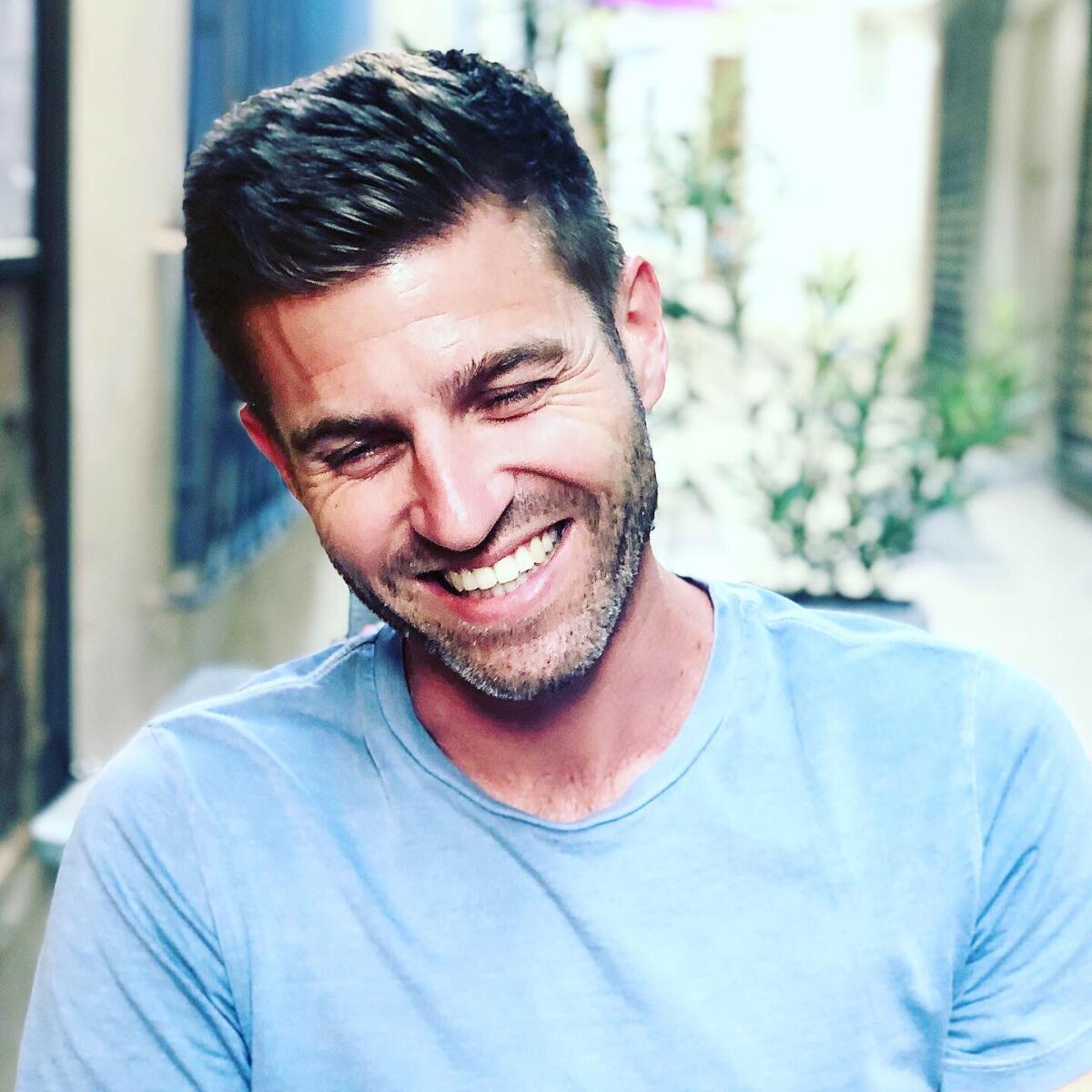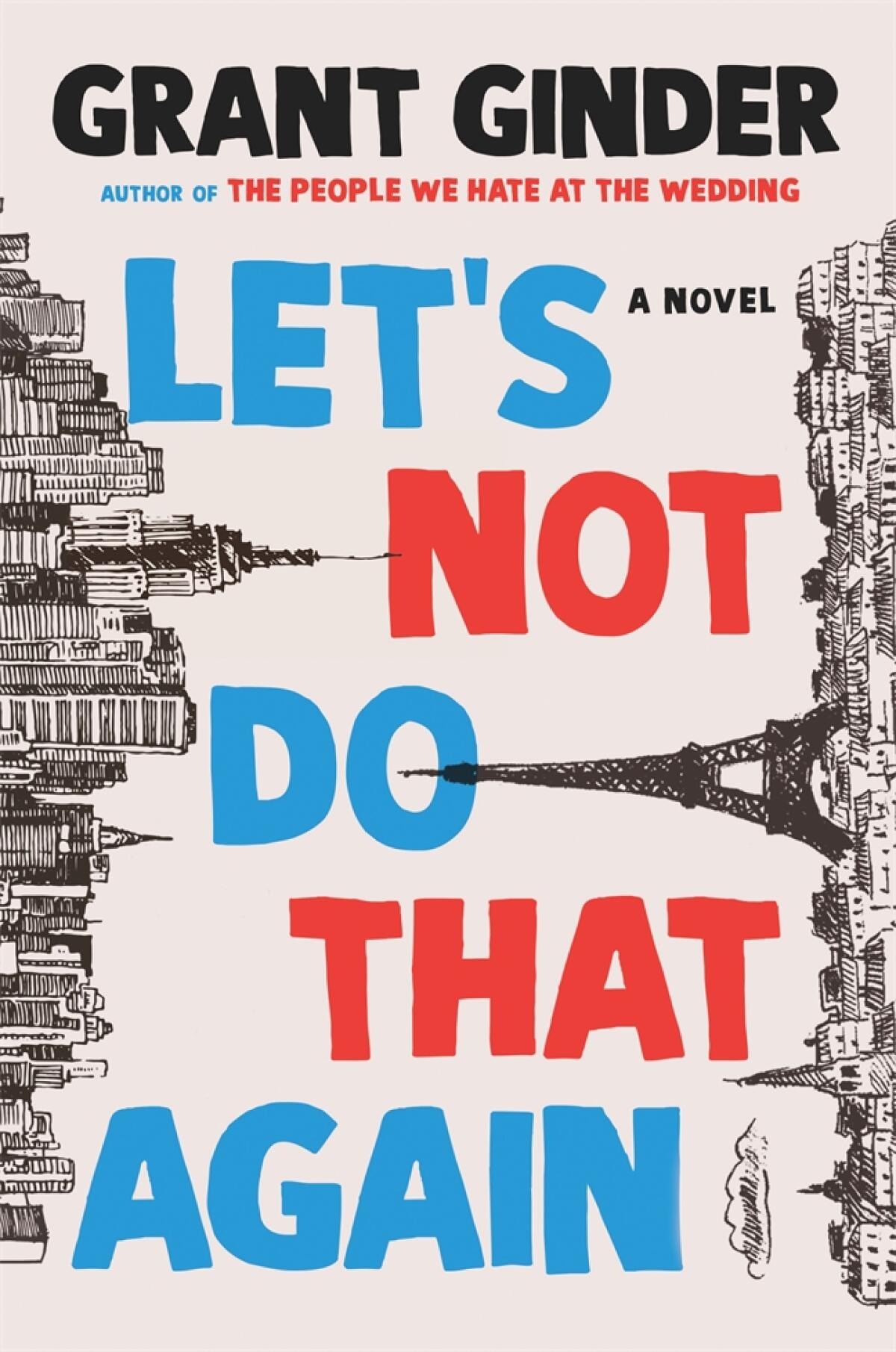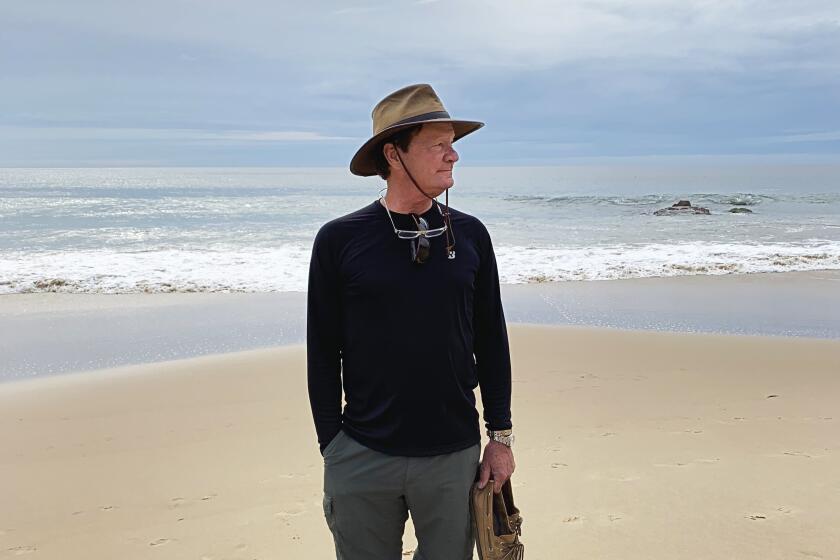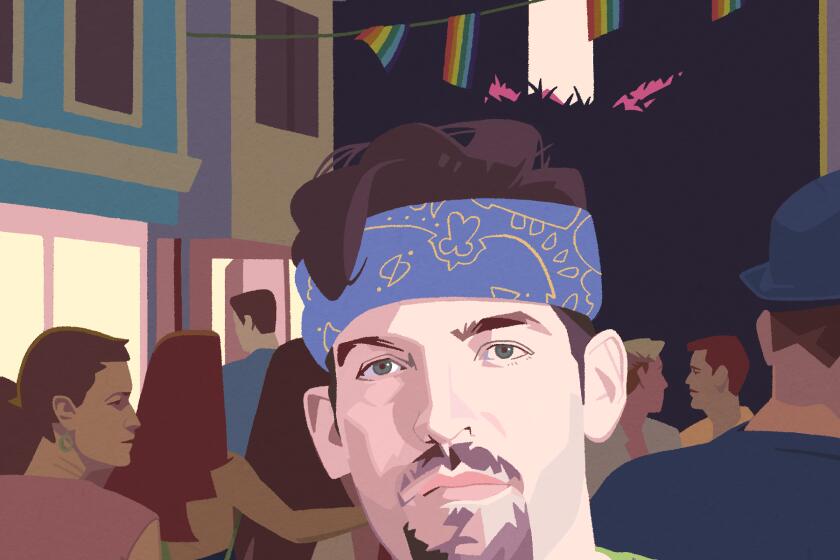âYou laugh until you cryâ: a Laguna-born novelist on his deep dysfunctional comedies

On the Shelf
'Let's Not Do That Again'
By Grant Ginder
Holt: 352 pages, $28
If you buy books linked on our site, The Times may earn a commission from Bookshop.org, whose fees support independent bookstores.
Grant Ginderâs publicist wanted me to be sure to check out his Twitter and Insta feeds because heâs âso funny.â
âIâm flattered that she thinks so,â says the novelist when I mention this to him over a recent Zoom conversation. âBut I think my husband would definitely disagree.â His husbandâs most common interjection, Ginder says, is âWhat were you thinking?â This was last uttered when a margarita-fueled bike ride resulted in a broken foot.
âWhat were you thinking?â sounds remarkably like a Grant Ginder title, of a piece with 2019âs âHonestly, We Meant Wellâ or next weekâs (yes, very funny) release, âLetâs Not Do That Again.â The new novel, set mainly in Manhattan and Paris, follows the Harrisons, a family in so many kinds of distress that a broken foot might come as a welcome distraction. Nancy Harrison, in the middle of a run for the Senate seat she inherited when her philandering husband died, has to cope with her daughter Gretaâs strange political hijinks in France and her son Nickâs misguided attempt to write a musical titled âHello to All That!,â based on the life of Joan Didion.
The author was surely born funny: His books, including âThe People We Hate at the Weddingâ (currently in film production with Kristen Bell and Allison Janney) and âHonestly, We Meant Well,â are classically comic novels. But their observational depth comes from Ginderâs lived experience â none more so than his latest.
After earning a political science degree at the University of Pennsylvania, Ginder worked in Washington, D.C., as a speechwriter with the Center for American Progress. Heâd interned on Capitol Hill as an undergraduate and grown fascinated with the âyouth cultureâ of media and politics geeks. âI had this instant group of friends who are still some of my closest friends today,â he says.
Yet Ginder quickly realized that the part he loved best about speechwriting was the storytelling. After three years in D.C., he moved to New York City. âI always wanted to get to New York, the center of literature and publishing,â he says, âin the same way that, when I was in high school, I wanted to get to the East Coast.â
Plot twist! Ginder, the picture of the hard-driving Easterner, was born and raised in laid-back Laguna Beach.
âA Thousand Steps,â Parkerâs 27th thriller, follows a teenage boy and his family in over their heads in Timothy Learyâs Laguna Beach.
âI did homework on the beach, getting sand in my textbooks, and I donât think any of us realized how lucky we were to be in that environment, with such incredible natural beauty all around us,â he says. âBut it was also a place, when I was 18, that I was ready to get the hell out of.â
It wasnât about the beach, or even the West Coast. After reminiscing for a few minutes about Lagunaâs now-defunct Boom Boom Room, âthis great old gay dive bar that had a Wednesday Drag Night,â the author acknowledges that, even though his parents were âincredibly supportiveâ when he came out, âthere were certainly no âoutâ gay students at my large public high school in Orange County. There were no real resources for a gay teenager. And my parents got that.â

Therein lie the roots of his just-dark-enough brand of comic fiction. âI do have a stable family, but itâs certainly not one without problems,â he says, âand what I appreciate about my family is that weâre very open about acknowledging those problems and talking through whatâs going on. ⌠Dysfunction and problems donât excuse people from the obligation of loving each other.â
Without giving away too much of âLetâs Not Do That Again,â itâs possible to say the novel puts that notion severely to the test. Nancy, the matriarch, reflects Ginderâs view that âwomen in politics still get the very, very, very short end of the stick. They have to work twice as hard, three times as hard, as men. I started writing this book during the Trump administration [after] watching the horrible treatment Hillary Clinton received during the 2016 campaign.â
Nancy, whose late husband wasnât very good at his job, discovers she is superb at it. âShe has strong convictions, but because sheâs had to work so hard to be in a position to use them, sheâs become quite hardened,â says Ginder. Unfortunately, as Nancy fights for her seat, Greta drifts into the sights of a French far-right operative named Xavier.
Hillary Clinton is more unvarnished than ever in âHillary,â a new docuseries from director Nanette Burstein premiering March 6 on Hulu.
France is another place in which Ginder has spent considerable time. âParis has very stark racial tensions, and the country as a whole is plagued with xenophobia,â he says. The countryâs devotion to liberty, equality and fraternity âis very focused on assimilation and shared values. That is changing, but very slowly, and it creates trouble when it comes to politics.â As Greta becomes more and more entangled with Xavier, playing into his terroristic designs on the United States, Ginder is able to play with the connections between the far right in both countries.
Comedy has always been the authorâs way into deeper issues. âYou know, you laugh and you laugh and you laugh until you cry,â he says. âWith this book in particular, I was writing at a time when our American democracy was being threatened by a president who told Orwellian lies constantly. I was editing the book during a pandemic and the strains a global health crisis put on our government. Those things led me to the question of: How far would a person go to protect something they see as sacred?â
In âLetâs Not Do That Again,â the Harrison family faces a difficult moral choice that is going to have a huge effect on national politics â one involving violence in the pursuit of supposedly noble ends. Some of the things Nancy and Greta get up to might seem dark, but Ginder believes âcharacters should be complex, particularly characters that, in the history of literature, have not been allowed to be complex. Why should cishet white men have all the fun and complications?â
They certainly wonât in Ginderâs next book, though it is a change-up â or rather a return to his roots. âItâs a novel about a gay teenager growing up in Laguna Beach in the â90s, and itâs my first novel told entirely in first person,â he says. The first-person Greta sections in âLetâs Not Do That Again,â he believes, âunlocked something in me. I like the challenge of it and the limitations it places on you too.â
Tentatively titled âBeefcake,â the forthcoming book is âabout, of course, family and the imperfect ways we love each other. As the world gets crazier and crazier, Iâm more attracted to finding the macro elements in smaller stories, instead of the other way around.â For Ginder, it seems, there are no small stories, just those that havenât yet been told.
Paul Lisickyâs memoir âLaterâ encapsulates a quarter-century of queer life
Patrick is a freelance critic who tweets @TheBookMaven.
More to Read
Sign up for our Book Club newsletter
Get the latest news, events and more from the Los Angeles Times Book Club, and help us get L.A. reading and talking.
You may occasionally receive promotional content from the Los Angeles Times.










